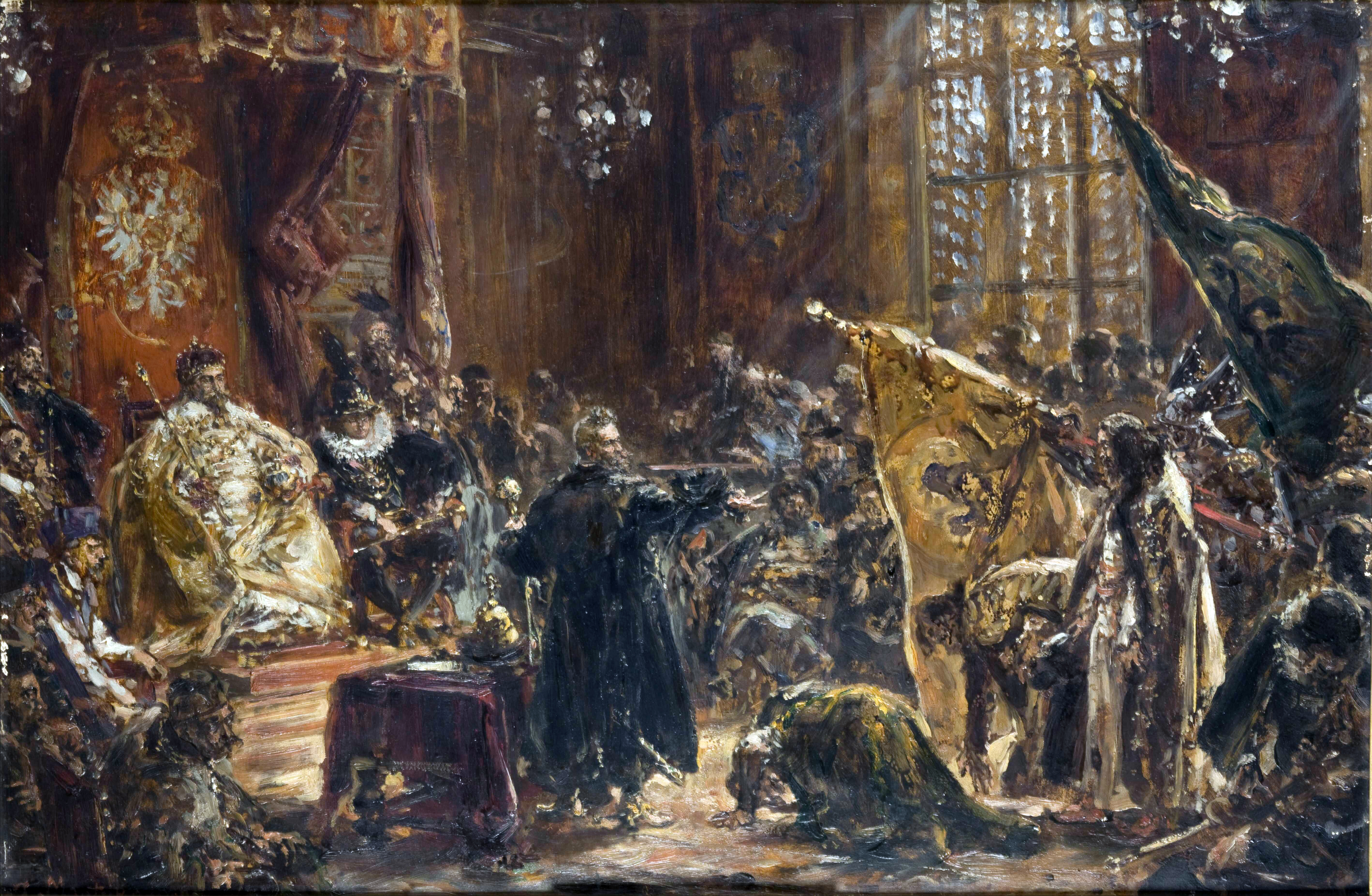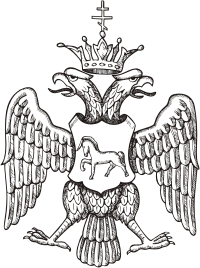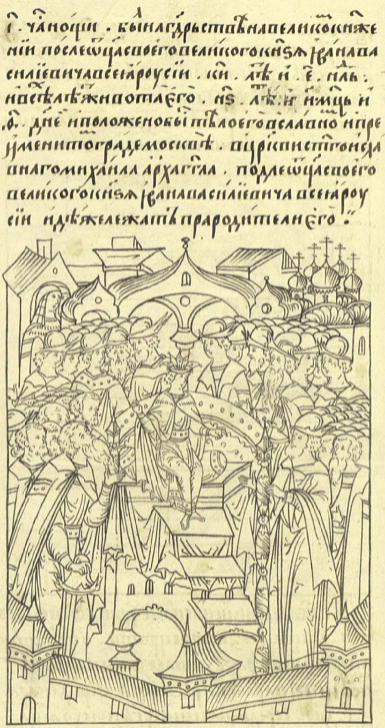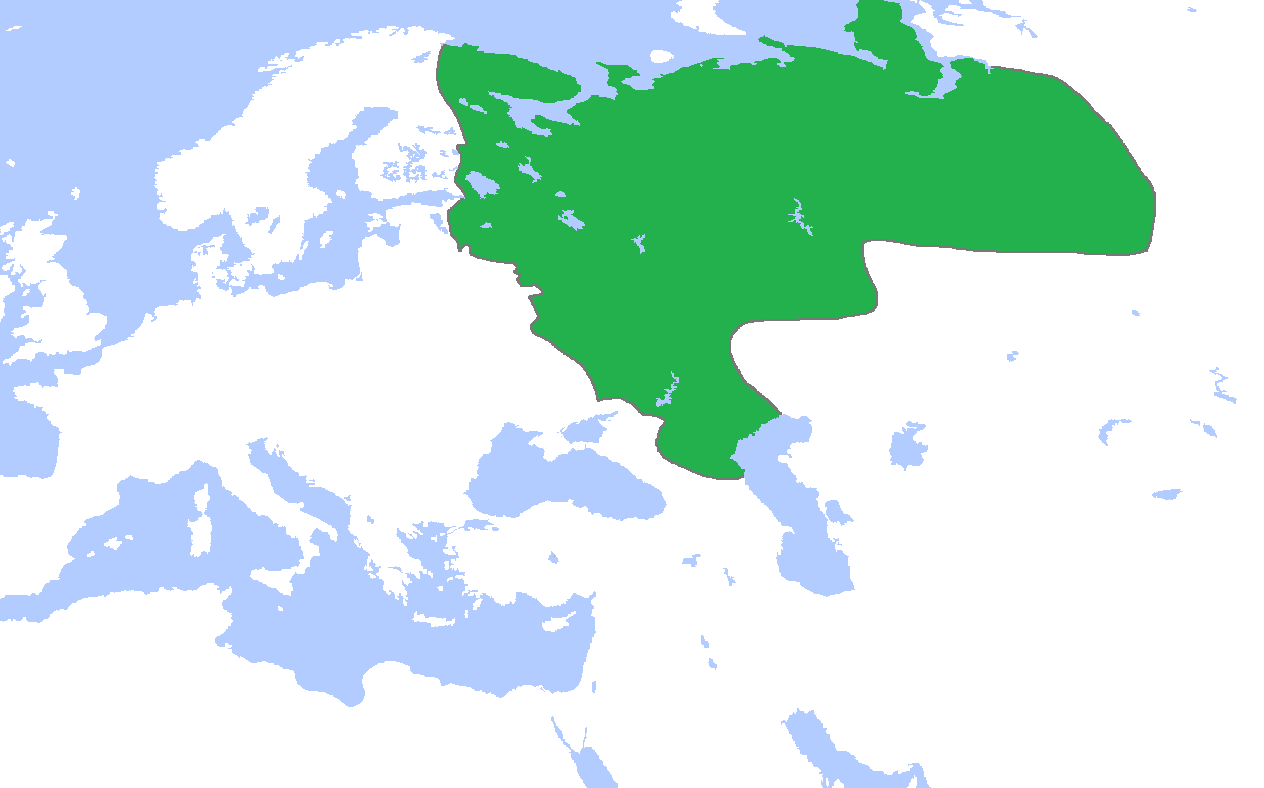|
Vasily Shuisky
Vasili IV Ivanovich Shuisky (, 12 September 1612) was Tsar of all Russia from 1606 to 1610, after the murder of False Dmitri I. His rule coincided with the Time of Troubles. He was the only member of House of Shuisky to become tsar and the last member of the Rurikid dynasty (Yurievichi branch) to rule as tsar. Life He was a son of Ivan Andreyevich Shuisky. Born Prince Vasili Ivanovich Shuisky, he descended from the Yurievichi sovereign princes of Nizhny Novgorod, and was allegedly a 20th-generation male-line descendant of the 9th-century Varangian prince Rurik. Vasili Ivanovich was one of the leading boyars of the Tsardom of Russia during the reigns of Feodor I () and Boris Godunov (). In the court intrigues of the Time of Troubles (1598–1613), Vasily and his younger brother Dmitry Shuisky usually acted together and fought as one. It was Shuisky who, in obedience to the secret orders of tsar-to-be Boris, went to Uglich to inquire into the cause of the death of the ... [...More Info...] [...Related Items...] OR: [Wikipedia] [Google] [Baidu] |
Tsar Of All Russia
The Tsar of all Russia, formally the Sovereign, Tsar and Grand Prince of all Russia, was the title of the Russian monarch from 1547 to 1721. During this period, the state was a tsardom. The first Russian monarch to be crowned as tsar was Ivan IV, who had held the title of sovereign and grand prince. In 1721, Peter I adopted the title of emperor and proclaimed the Russian Empire. The old title continued to be popularly used to refer to the emperor. Title The full title varied between tsars. The full title of Alexis was: History 15th century According to Ihor Ševčenko, the Russian claim to imperial rank dates to at least the 15th century, and is "characterized by the first deliberate Russian (not exclusively Muscovite) attempts to transform Russian princes into the counterparts of the Byzantine emperors, and later to claim the Byzantine heritage for themselves and their land", when the grand prince of Moscow added "ruler of all-Russia" to their title at the time he asser ... [...More Info...] [...Related Items...] OR: [Wikipedia] [Google] [Baidu] |
Yurievichi
Yuri I Vladimirovich (; ; c. 1099 – 15 May 1157), commonly known as Yuri Dolgorukiy (, ) or the Long Arm, was a Monomakhovichi prince of Rostov and Suzdal, acquiring the name ''Suzdalia'' during his reign. Noted for successfully curbing the privileges of the landowning ''boyar'' class in Rostov-Suzdal and his ambitious building programme, Yuri transformed this principality into the independent power that would evolve into early modern Muscovy. Yuri Dolgorukiy was the progenitor of the Yurievichi ( ), a branch of the Monomakhovichi. Yuri spent much of his life in internecine strife with the other Rus' princes for suzerainty over the Kievan Rus, which had been held by his father ( Vladimir Monomakh) and his elder brother before him. Although he twice managed to briefly hold Kiev (in September 1149 – April 1151, again in March 1155 – May 1157) and rule as Grand Prince of Kiev, his autocratic rule and perceived foreigner status made him unpopular with the powerful Kieva ... [...More Info...] [...Related Items...] OR: [Wikipedia] [Google] [Baidu] |
Ivan The Terrible
Ivan IV Vasilyevich (; – ), commonly known as Ivan the Terrible,; ; monastic name: Jonah. was Grand Prince of Moscow, Grand Prince of Moscow and all Russia from 1533 to 1547, and the first Tsar of all Russia, Tsar and Grand Prince of all Russia from 1547 until his death in 1584. Ivan's reign was characterised by Russia's transformation from a medieval state to a fledgling empire, but at an immense cost to its people and long-term economy. Ivan IV was the eldest son of Vasili III of Russia, Vasili III by his second wife Elena Glinskaya, and a grandson of Ivan III of Russia, Ivan III. He succeeded his father after his death, when he was three years old. A group of reformers united around the young Ivan, crowning him as tsar in 1547 at the age of 16. In the early years of his reign, Ivan ruled with the group of reformers known as the Chosen Council and established the ''Zemsky Sobor'', a new assembly convened by the tsar. He also revised the Sudebnik of 1550, legal code and in ... [...More Info...] [...Related Items...] OR: [Wikipedia] [Google] [Baidu] |
Tsarevich Dmitry Ivanovich Of Russia (born 1582)
Dmitry Ivanovich (; – 15 May 1591) was the youngest son of Russian tsar Ivan the Terrible. He was the tsarevich (heir apparent) for close to seven years of his half-brother Feodor I's reign (though his legitimacy as an heir could have been contested by the Russian Orthodox Church). After his death, he was impersonated by a number of imposters to the throne, during the Time of Troubles. Life Dmitry was the youngest son of Ivan the Terrible by his last wife Maria Nagaya, and their only child together. Ivan died in 1584, and was succeeded by Dmitry's older brother, Feodor I. Feodor was sickly and weak, and the country was governed by a regency council. This was headed from 1586 by Boris Godunov, Feodor's brother-in-law and Malyuta Skuratov's son-in-law. In 1584, Godunov sent Dmitry, and his mother and her brothers, into internal exile in the tsarevich's appanage of Uglich. On 15 May 1591, Dmitry died there under mysterious circumstances. As a result, when Feodor I died c ... [...More Info...] [...Related Items...] OR: [Wikipedia] [Google] [Baidu] |
Tsarevich
Tsarevich (, ) was a title given to the sons of tsars. The female equivalent was ''tsarevna''. Under the 1797 Pauline Laws, Pauline house laws, the title was discontinued and replaced with ''tsesarevich'' for the heir apparent alone. His younger brothers were given the title of ''List of grand dukes of Russia, veliky knyaz'', translated as ''grand prince'' or, more commonly, as ''grand duke''. Historically, the term was also applied to descendants of the Khan (title), khans (tsars) of Khanate of Kazan, Kazan, Qasim Khanate, Kasimov, and Siberia Khanate, Siberia after these khanates had been conquered by Russia. The descendants of the deposed royal families of Georgia or the ''batonishvili'' were given the titles of tsarevich until 1833, when they were demoted to ''knyaz'' after a 1832 Georgian plot, failed coup to restore the Georgian monarchy. Notes References Tsareviches of Russia, Noble titles of Russia Russian royalty {{royal-stub ... [...More Info...] [...Related Items...] OR: [Wikipedia] [Google] [Baidu] |
Uglich
Uglich ( rus, У́глич, p=ˈuɡlʲɪtɕ) is a historic town in Yaroslavl Oblast, Russia, located on the Volga River. Population: History The city was first documented in 1148 as ''Ugliche Pole'' (''Corner Field''). The town's name is thought to allude to the nearby turn in the Volga River, and is derived from the Russian word ''ugol'' (a corner, a nook). Principality of Uglich From 1218 until 1328, Uglich was the seat of a small princedom. At that time, the local princes sold their rights to the great prince of Moscow. Uglich was a border town of the Grand Duchy of Moscow, and it was burned several times in conflicts by Lithuanians, Tatars, and the grand prince of Tver. Grand Duke Ivan III of Moscow gave the town in 1462 to his younger brother Andrey Bolshoy (Andrey the Great). During Andrey's reign, the town was expanded and the first stone buildings were constructed. Particularly notable were the cathedral (rebuilt in 1713), the Intercession Monastery (destroy ... [...More Info...] [...Related Items...] OR: [Wikipedia] [Google] [Baidu] |
Dmitry Shuisky
Prince Dmitry Ivanovich Shuisky (; died 1613) was a Russian boyar from the Shuisky family, a younger brother to Vasily IV of Russia. Life As a playmate of young Tsarevich Feodor Ivanovich, Dmitry was said to accompany him day and night in his devout wanderings from monastery to monastery. In 1584, his slandering of Prince Ivan Belsky led to riots in Moscow. Two years later, he was attested as a governor of Kargopol. On Fyodor's accession to the throne, he quarrelled with another boyar, Boris Godunov, and was expelled to his family patrimony in Shuya. Later, he made peace with Godunov and married his sister-in-law. Shuisky is best remembered as a singularly incapable general. He was routed by False Dmitry I in 1606 and shared disgrace and imprisonment with his brother Vasily. When the latter was elected as the tsar, he put Dmitry in charge of the army which would lose its every battle against the Polish invaders and their allies. At last he was relieved of his duties and repla ... [...More Info...] [...Related Items...] OR: [Wikipedia] [Google] [Baidu] |
Boris Godunov
Boris Feodorovich Godunov (; ; ) was the ''de facto'' regent of Russia from 1585 to 1598 and then tsar from 1598 to 1605 following the death of Feodor I, the last of the Rurik dynasty. After the end of Feodor's reign, Russia descended into the Time of Troubles. Early years Boris was the son of Feodor Ivanovich Godunov "Krivoy" (, died c. 1568–1570) and his wife Stepanida Ivanovna. His older brother Vasily died young and without issue. There is a version according to which the Godunovs were descended from the Tatar ''murza'' Chet, who came to Russia in 1330 during the reign of Ivan Kalita. This version was included in later editions of the 16th-century '' Gosudarev Rodoslovets'', but historians have raised doubts about this version of Godunov's ancestry due to various chronological and genealogical issues. Godunov's career began at the court of Ivan the Terrible. He is mentioned in 1570 for taking part in the Serpeisk campaign as an archer of the guard. The following yea ... [...More Info...] [...Related Items...] OR: [Wikipedia] [Google] [Baidu] |
Feodor I Of Russia
Feodor I Ioannovich () or Fyodor I Ivanovich (; 31 May 1557 – 17 January 1598), nicknamed the Blessed (), was Tsar of all Russia from 1584 until his death in 1598. Feodor's mother died when he was three, and he grew up in the shadow of his father, Ivan the Terrible. He was a pious man of retiring disposition and possibly suffered from mental disability. He took little interest in politics, and the country was effectively administered in his name by Boris Godunov, the brother of his beloved wife Irina. He died childless and was succeeded by Godunov as tsar, marking the end of the rule of the Rurik dynasty and spurring Russia's descent into the catastrophic Time of Troubles. He is listed in the Great Synaxaristes of the Eastern Orthodox Church, with his feast day on 7 January (O.S.). Early life Feodor was born on 31 May 1557 in Moscow, the third son of Ivan the Terrible by his first wife Anastasia Romanovna. He was baptized at the Chudov Monastery and his godfather was Mac ... [...More Info...] [...Related Items...] OR: [Wikipedia] [Google] [Baidu] |
Boyar
A boyar or bolyar was a member of the highest rank of the feudal nobility in many Eastern European states, including Bulgaria, Kievan Rus' (and later Russia), Moldavia and Wallachia (and later Romania), Lithuania and among Baltic Germans. Comparable to Dukes/Grand Dukes, Boyars were second only to the ruling princes, grand princes or tsars from the 10th to the 17th centuries. Etymology Also known as ''bolyar''; variants in other languages include or ; , , ; , ; and . The title Boila is predecessor or old form of the title Bolyar (the Bulgarian word for Boyar). Boila was a title worn by some of the Bulgar aristocrats (mostly of regional governors and noble warriors) in the First Bulgarian Empire (681–1018). The plural form of boila ("noble"), ''bolyare'' is attested in Bulgar inscriptions and rendered as ''boilades'' or ''boliades'' in the Greek of Byzantine documents. Multiple different derivation theories of the word have been suggested by scholars and linguists ... [...More Info...] [...Related Items...] OR: [Wikipedia] [Google] [Baidu] |
Rurik
Rurik (also spelled Rorik, Riurik or Ryurik; ; ; died 879) was a Varangians, Varangian chieftain of the Rus' people, Rus' who, according to tradition, was invited to reign in Veliky Novgorod, Novgorod in the year 862. The ''Primary Chronicle'' states that Rurik was succeeded by his kinsman Oleg the Wise, Oleg who was regent for his infant son Igor of Kiev, Igor. Traditionally, Rurik has been considered the founder of the Rurik dynasty, which was the ruling dynasty of Kievan Rus' and its principalities, and ultimately the Tsardom of Russia, until the death of Feodor I of Russia, Feodor I in 1598. As a result, he is considered to be the traditional founder of the Russian monarchy. Life The earliest mention of Rurik is contained in the ''Primary Chronicle'', traditionally ascribed to Nestor the Chronicler, Nestor and compiled in , which states that East Slavs, East Slavic and Finnic peoples, Finnic tribes in 860–862 (including the Chuds, Novgorod Slavs, Slovenes, Krivichs ... [...More Info...] [...Related Items...] OR: [Wikipedia] [Google] [Baidu] |
Varangian
The Varangians ( ; ; ; , or )Varangian ," Online Etymology Dictionary were conquerors, traders and settlers, mostly from present-day Sweden, who settled in the territories of present-day Belarus, Russia and Ukraine from the 8th and 9th centuries and established the state of as well as the principalities of and Turov. They also ... [...More Info...] [...Related Items...] OR: [Wikipedia] [Google] [Baidu] |






